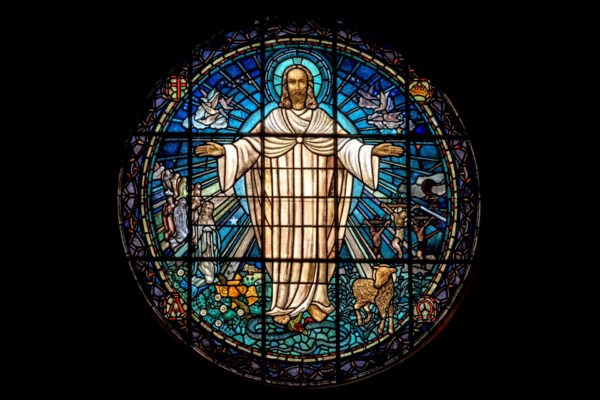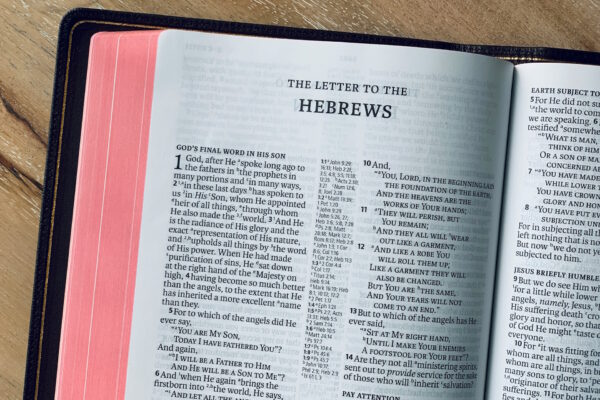* The audio for this sermon is unavailable due to a technical difficulty with the recording. The following is Pastor Matt’s sermon manuscript:

All of us love a good story. We love stories about epic challenges between good and evil, ultimate showdowns between the weak and the strong, and thrilling contests with an unlikely hero. We love fiction like “Star Wars” or “The Lord of the Rings.” We love the real-life stories about the Protestant Reformers, those who fought against slavery, or even “The Miracle on Ice.” In the Bible, we love to read the true stories of Moses versus Pharaoh, Gideon against the Midianites, David challenging Goliath, Esther and Haman, and Israel against the world. And today, in Isaiah 36-37, we find one of the best. It’s the historical account of the showdown that took place between Hezekiah, king of Judah and Sennacherib, king of Assyria in 701 BC.
Remember, the message of the whole book has been about whether Judah would trust the Lord Yahweh or the nations for their deliverance from the mighty Assyrian empire (the bully out to take everyone’s lunch money). Everything has all been leading up to this critical moment. In fact, this story is found three times in Scripture (see 2 Kgs. 18:13-19:37 and 2 Chr. 32:1-22)! And incredible archeological evidence has proven this account to be historically accurate—from sculptures depicting the siege of Lachish (v.2) from Sennacherib’s palace in Nineveh, as well as his very own written account detailing his conquest of 46 strongholds in Judah.[i]
Yet this story is not simply a contest between two kings or two nations. This is actually an epic showdown between arrogant humanity and the living God—the Maker of heaven and earth, the Sovereign of the nations, the Holy One of Israel. And the question, as always, is: Can God be trusted? Is he strong enough, is he good enough, to deliver us? Will he be faithful to keep all his promises?
In this story, we will see that those who trust in the Lord find him to be the deliverer they truly need. No matter how relentless the schemes of the devil are, no matter how hopeless the situation is, and no matter how undeserving we are, the Lord is a mighty and gracious King.
ACT 1: Assyria’s Ultimatum (36:1-22; 37:10-13)
As the story begins, we find Sennacherib king of Assyria has come up against all the fortified cities of Judah and taken them. He’s just taken the city of Lachish, and Jerusalem now is left. So, he sends his field commander—the Rabshakeh—with a great army and an ultimatum for King Hezekiah. But it’s important to notice where this ultimatum is being given. Look at the end of verse 2: And he stood by the conduit of the upper pool on the highway to the Washer’s Field. This is the exact spot that his father, King Ahaz, stood some 35 years earlier when, in Isaiah 7, the Lord told him to not fear the nations but be firm in his faith, for he would deliver them.
But do you remember how Ahaz responded when God told him to ask for a sign? He refused to “put the Lord to the test.” Why? Because in reality, he had chosen worldly wisdom over faith. So, Isaiah told him: “7 Therefore, behold, the Lord is bringing up against [you] the waters of the River, mighty and many, the king of Assyria and all his glory. And it will rise over all its channels and go over all its banks, 8 and it will sweep on into Judah, it will overflow and pass on, reaching even to the neck” (Isa. 8:7-8a). And that’s exactly what happened in 701 bc—our text today. Because of his father’s unbelief, because God’s Word of judgment had proven true, King Hezekiah is now faced with essentially the same decision: Will he trust the Lord?
The message, in the form of an ultimatum, given by Assyria to Hezekiah’s delegates is a mix of the stubborn ignorance of Pharaoh, the arrogant defiance of Goliath, and the crafty lies of the serpent (Isa. 36:4-22). This is none other than one of the devil’s evil schemes. And here, as clear as day, we see once again the central question of Isaiah: “On what do you rest this trust of yours? . . . In whom do you now trust?” What hope do you have of deliverance? To undermine their confidence and demoralize them, the king calls into question the possible objects of their faith: “Are you trusting in your military power? Your army is useless. Even if we were to give you two thousand horses, you wouldn’t be able to even find riders for them! And your alliance with Egypt? Worthless! Lean on them for support and it will only cost you.”
Church, this is what Isaiah had been telling them all along! King Sennacherib is telling the truth here, and he’s absolutely right: Judah had no power, and no alliance could save them. But then he insults their God. First, he calls their trust in the Lord pointless. “You trust your God? Didn’t your king have all his high places and altars torn down? And besides, the Lord himself told me to destroy you!” In other words, he’s telling Judah: “Your God is against you!” Again, there’s some truth to this. Hezekiah did tear down altars, and Isaiah had been preaching that the Lord would use Assyria as an instrument of judgment against Judah.
Beloved, this is exactly how the devil seeks to deceive us: by twisting the truth, speaking lies that have a ring of truth to them and sound like something God has actually said! Even though Hezekiah did tear down the high places (which he was supposed to do), and though Assyria was a tool in God’s hand, this did not mean that God was against them! Though the truth was told in part, it was actually the devil that was against God’s people. The king first called their trust in the Lord pointless; but in his second speech to all the people he calls their God powerless. Here, he challenges God’s ability to deliver them. In the second speech, and his third message in 37:10-13, he lists all the nations he has conquered and says (v.10): “Do not let your God in whom you trust deceive you” with any promises of salvation.
But here is where Sennacherib not only twists the truth but makes a monumental mistake. Yes—not one of the gods of the nations had ever been able to deliver his land from Assyria. But the Lord Yahweh is not just another god among gods. The God of Israel is the one true and living God! He is the Holy One, eternal and transcendent, totally other than all creation. Now, if Israel’s God is just another one of the gods, if their worship is no different than any other religion, then Sennacherib’s argument is lethal. But because Yahweh is the living God, then all Assyria’s victories mean nothing! Jerusalem’s deliverance “has nothing to do with Sennacherib’s power,” but everything to do with whether they will trust in the Lord.[ii]
Friends, this is what the devil has been doing to humanity ever since the garden of Eden: He makes us doubt God’s word, his promises, his character, and his love. Using half-truths and deceitful schemes, he tempts us to question what God has really said and who God really is. When we sin, he tries to accuse us before God and make us doubt God’s grace. When we fail, he tempts us to despair and reminds us of our guilt. When others sin against us, he leads us into bitterness and unforgiveness. When we do good, he makes us believe we are self-sufficient. He hisses in our ears: “You think God is good? Look at the suffering he’s putting you through! He loves you? Surely, you’d feel it if he did! It’s more blessed to give than receive? No; live for yourself! Devote yourself to a local church? Do your own thing! Love your enemies? They don’t deserve it! Obedience leads to joy? You need to be free! Repent? Only other people need that.” He holds out a cheap imitation, a knock-off brand, of all that God promises to us—joy, peace, rest, and security—but tempts us to believe that the way to obtain these blessings is by not trusting the Lord and believing his Word. Instead, we just need to do what we think is right.
And so, Sennacherib’s devilish ultimatum is given: 36:16 “Thus says the king of Assyria: Make your peace with me.” “Don’t trust the Lord. Don’t listen to Hezekiah. Trust me. If you don’t, we’ll besiege your city and cause you unimaginable pain and suffering. You will perish unless you follow me. But in reality, the Lord was not against his covenant people. He had not deceived them. Rather, he had brought them to the end of their resources so that Judah might depend upon her God in wholehearted trust.[iii] This is what “the God who waits to be gracious” does—he will expose the bankruptcy of our idols and failed allegiances to show us our desperate need for his grace! This is why Paul reminds us in Ephesians to “be strong in the Lord and in the strength of his might. Put on the whole armor of God, that you may be able to stand against the schemes of the devil” (6:10-11). And this is exactly what Hezekiah does.
ACT 2: Hezekiah’s Response (37:1-20)
Hezekiah’s response in verses 1-7 is exactly what it looks like to trust the Lord. What does he do? First, he humbled himself, putting on sackcloth. Notice his first words to Isaiah in v.3: “This day is a day of distress, of rebuke, and of disgrace.” He’s admitting their failure to trust God. They deserved this. They need deliverance or else they would die, but had no strength to do it.[iv] Second, he went into the house of the Lord (v.1). We’ll look at this more closely in just a minute, but here we see that Hezekiah knew the answer he sought would only be found in the Lord. Third, he sought the word of the Lord, from the prophet Isaiah. He had heard what the great king of Assyria had said (a repeated phrase), but he needed to hear what “thus says the Lord!” And notice Isaiah’s response: “Do not be afraid”—exactly what God had told King Ahaz (7:4)! Again, the Lord repeats his promise to deliver Judah from Sennacherib (v.8): A mere rumor would be enough to cause him to withdraw, and eventually he would be slain in his own land.
This is what it looks like to trust God. (1) It’s to first confess our sinful failure to do so, and our reliance upon idols. (2) It’s to turn to God’s Word and remind ourselves of how trustworthy he is, what he has promised and what he has done. And (3) it’s to depend upon the Lord in prayer.
Look with me now at vv.14-20. After Sennacherib withdrew to deal with another threat (notice God’s word is already being sovereignly fulfilled), he sends a message to Hezekiah for a third time, repeating his previous threats, and again mocking their trust in their “powerless” God. We’re going to be spending all next week looking at this prayer in more depth, because it’s so important for us to understand. But for now, notice the key elements of his prayer:
First, he brings his need before the Lord. Second, he confesses who God is in all his glory. Third, he acknowledges the painful reality of his situation. But most importantly, he calls upon the Living God to defend the glory of his name, to respond to how he’s been mocked. He doesn’t base his prayer on any righteousness of his own, on any merit of the nation; he bases his prayer for deliverance “on the undeserved grace of the Sovereign of the nations.”[v]
Beloved, this is trust. This is saving faith. This is believing God. This is true worship! Instead of keeping his eyes fixed on himself, his situation, or his needs, he lifts his eyes to Living God. And beholding God’s glory, his perspective changes. His primary concern is not for his own glory, but for God’s kingdom to come, for God’s will to be done, for the nations to see God’s glory! [vi] When we pray, is our focus primarily on our needs, our reputation, our comfort? Or do we care most about God’s will, his reputation, his name being made known in all the earth? When we find ourselves needing a miracle, how quick do we run to the truth of God’s powerful Word? One pastor observes: “All too often our well-being is the end and God is only a means to that end.”[vii] But real faith is a dependence upon God, looking to decrease that he might increase.
ACT 3: Yahweh’s Deliverance (37:21-38)
Because King Hezekiah trusted in the Lord and prayed, God is moved to action (Isa. 37:21-35). In vv.21-29, God speaks a word of judgment against Sennacherib. Despite his arrogant boasts and all his impressive achievements, in the end it was the Lord Yahweh who was sovereignly orchestrating it all to make his glory known in their downfall! We saw this back in Isaiah 14:24: “…As I have purposed, so shall it stand, 25 that I will break the Assyrian in my land…” Then, in vv.30-32, the Lord gives a sign to Hezekiah (again, like Isa. 7!) that the siege would end, and that they would soon be enjoying the fruit of their land. As God had promised, a believing remnant would be saved, for “the zeal of the Lord of hosts will do this.” (like Isa. 9!) And finally, in vv.33-35, God declares that Sennacherib won’t be able to do a single thing to the city. Why? “For I will defend this city to save it, for my own sake and for the sake of my servant David.” God would be faithful to redeem and preserve a people for himself, for his name’s sake.
And then, in three brief verses, Sennacherib’s showdown with the Living God comes to an end (READ vv.36-38). 185,000 Assyrians died over night and Jerusalem was miraculously delivered! Like a fly killed with a flyswatter, or a bug crushed by a boot, this mighty army is gone in a moment. And roughly 20 years later, according to the word of the Lord, Sennacherib was killed by his own sons—get this—while worshiping in the house of his god!!! His lifeless god deceived him.
What’s fascinating about this ending is that in Sennacherib’s annals, after describing all his victories in his campaign in the west, he only says that he shut Hezekiah up in Jerusalem “like a bird in a cage.” Then, he simply goes on to describe his other victories that took place after. Today, we have historical records of his victories, even of his assassination, but no mention of this defeat—yet he never campaigned in Judah ever again. Why? Because this defeat actually happened! Judah was saved from the hands of the mighty Assyrian empire by trusting in God!
Conclusion
Friends, if this true story isn’t enough to convince you that the Living God is the Sovereign Deliverer of all who trust in him, don’t forget that this story is ultimately meant to point us to the true and better deliverance that God worked for his people when he sent his Son, Jesus Christ into the world. Like Judah, we have all failed to trust the Lord. We have all believed the lie of the serpent at one time or another. And as a result, we are all guilty of sin, of rebellion against the Living God, and find ourselves under siege by the spiritual forces of darkness and the power of death.
But just like King Hezekiah succeeded in trusting God where Ahaz failed, so King Jesus succeeded in faithful obedience where Adam failed! Romans 5:17: “For if, because of one man’s trespass, death reigned through that one man, much more will those who receive the abundance of grace and the free gift of righteousness reign in life through the one man Jesus Christ.” When Jesus gave himself on the cross as our atoning sacrifice for sin, he triumphed over the forces of darkness! When he rose from the dead, our enemy was defeated. Now, for those who trust in King Jesus by faith, he delivers us from the power of sin and even the reign of death. And because of Christ’s work on the cross, our accuser is silenced! No matter the temptations, accusations, or deceitful schemes thrown at us—and no matter how many times we may fail to continue trusting him—we can be sure that there is no condemnation for those in Christ Jesus.
So, how do we respond to this good news of deliverance? Trust Christ! Put your faith in the risen Lord Jesus! Hear the promise of salvation held out in the gospel of grace, confess your failure to believe God, and hold fast to his Word of love in obedient faith! Cling to every one of his promises. Be strong in the Lord. Put on the whole armor of God, so that you may stand against the devil’s schemes. Fasten on the belt of truth and wield the sword of the Word. Put on the breastplate of Christ’s righteousness and stand firm in the peace of God. Guard your heart with the shield of faith and your mind with the helmet of salvation. And depend upon the Lord in fervent prayer.
Those who trust in the Lord find him to be the deliverer they truly need. So, let’s follow King Jesus with such a vibrant faith that the world may know our deliverer is the Living God.
Endnotes
[i] Barry Webb, The Message of Isaiah: On Eagles’ Wings, ed. J. A. Motyer and Derek Tidball, The Bible Speaks Today (England: Inter-Varsity Press, 1996), 148, ftn 3.
[ii] Ibid., 642.
[iii] Webb, The Message of Isaiah, 149.
[iv] Raymond C. Ortlund Jr. and R. Kent Hughes, Isaiah: God Saves Sinners, Preaching the Word (Wheaton, IL: Crossway Books, 2005), 210.
[v] John N. Oswalt, The Book of Isaiah, Chapters 1–39, The New International Commentary on the Old Testament (Grand Rapids, MI: Wm. B. Eerdmans Publishing Co., 1986), 654.
[vi] Webb, The Message of Isaiah, 152.
[vii] Oswalt, Isaiah, Chapters 1–39, 655–656.




